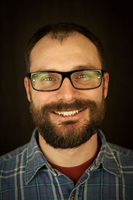Member Spotlight
Dimitri R. Dounas-Frazer
University of Colorado Boulder, Boulder, Colorado
I joined AAPT in 2012, during my last year of grad school. Back then I was doing experimental atomic physics research, but my research interests were changing. Coming from a family of teachers, I always felt a strong pull towards education. Joining AAPT was a big part of my transition into physics education research. In particular, the 2012 Summer Meeting was crucial for forging professional connections with people who would later become my colleagues, mentors, and friends in the world of physics education.
These days I study the experiences of, and interactions among, students and instructors in undergraduate laboratory courses. I am particularly interested in exploring the role of iteration in these courses. Providing students with opportunities to iteratively improve an experiment can be a powerful way to engage them in model-based reasoning, support them in taking ownership of a project, and, by analogy, give them tools and language to think and talk about improving themselves as learners. This research niche is perfect for me because it allows me to work in the intersection of two fields that I love: experimental physics and education. I am extremely grateful to Dr. Angela Little, Dr. Bethany Wilcox, Dr. Heather Lewandowski and the PER group at the University of Colorado Boulder for supporting my transition into this niche of physics education research.
I am also committed to improving physics culture, which is informed by (and, in turn, informs) broader social contexts. This means actively identifying, naming, and combatting racism, cis-hetero-sexism, ableism, and other forms of oppression, exclusion, and discrimination in physics. I think three things are imperative: (i) physics organizations must support, respect, and co-work with equity-oriented efforts led and/or initiated by people from marginalized groups; (ii) physics departments must recruit, admit, hire, and support students, teachers, and professors from marginalized groups; and (iii) physicists must educate ourselves about historical and ongoing forms of oppression, different modes of allyship, and how oppression and allyship manifest in physics, education, and their overlaps. To the latter goal, I am fortunate to collaborate with Dr. Daniel Reinholz and graduate students Simone Hyater-Adams and Katie Rainey on the ongoing facilitation of workshops for physics students who are committed to co-learning with us about issues of equity, inclusion, and accessibility in physics. This work is part of CU-Prime, a student-led diversity organization in the Department of Physics at the University of Colorado Boulder. CU-Prime is a member of The Access Network, a growing network of similar diversity-oriented programs across the United States.
Looking to the future, I am excited to continue working with the AAPT community towards both of these professional aspirations: improving teaching and learning experiences in lab courses, and improving equity and inclusion in physics. My experience over the last 3 years as a member of the AAPT Committee on Diversity has been incredibly positive in this regard, and I look forward to the next 3 years as a member of the Committee on Labs.


